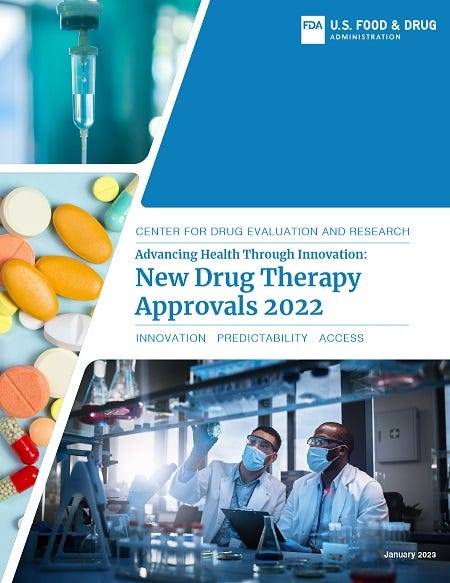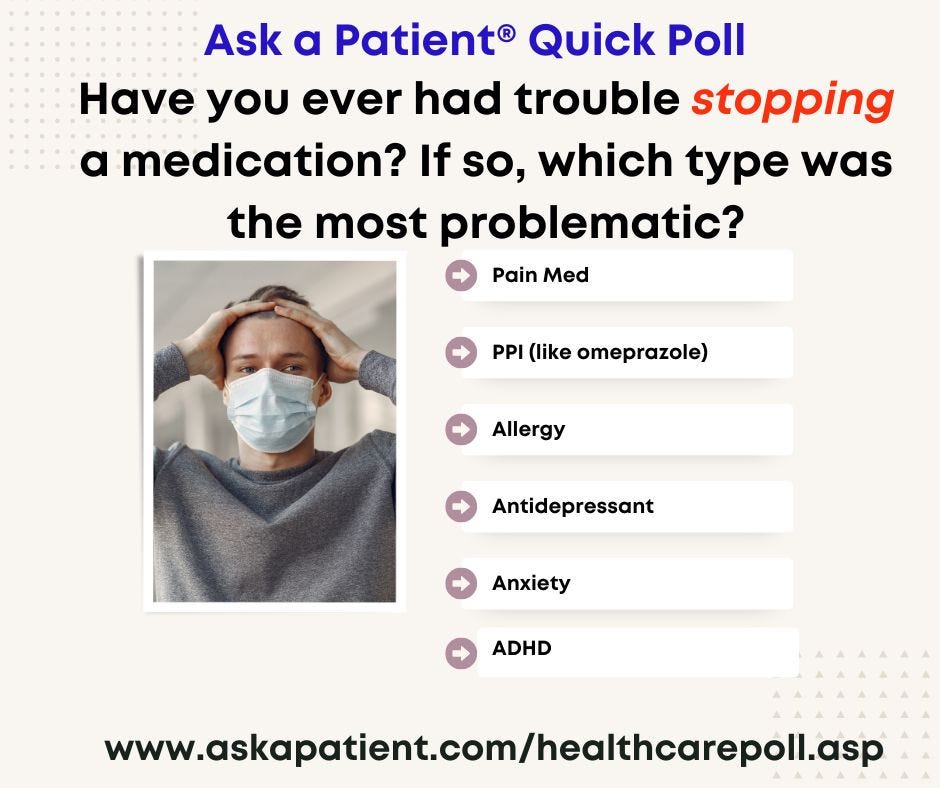January 13, 2023: New treatments in 2022; FDA label changes; Heart failure drug review; research capsules on water pills study, diet and epilepsy, AMD and vitamin supplements, and clonidine for PTSD
Notable Drug Approvals of 2022: Highlights of the FDA Year-End Report
In 2022, the U.S. Food and Drug Administration's Center for Drug Evaluation (CDER) approved 37 "novel" drugs, which are drugs never before marketed or approved in the U.S. While the CDER says it received the same number of new drug applications in 2022 as it did in 2021, it approved a larger number of them in previous years: 51 approvals in 2021 and 53 in 2020. Lately, the FDA has come under scrutiny for its fast-track approval of some drugs (like the Alzheimer's drug Aduhelm and certain cancer drugs) despite the risk of serious side effects and incomplete clinical trials data. In 2022, 24 of CDER’s 37 drug approvals (65%) used at least one of the expedited approval programs.
In 2022, 20 of the 37 newly approved drugs treat rare diseases, and 25 of the 37 are designated as "First in U.S." because they have never been approved by any other country. Here's a rundown of the number of new treatments by major category:
ALS (Lou Gerhig's Disease): 1
Anemia (rare types): 2
Burn treatment gel (severe; hospital use): 1
Cancer (mainly relapsing/advanced): 11
Diabetes: 1
Diagnostic Imaging: 2
Glaucoma: 1
Heart disease (hypertrophic cardiomyopathy): 1
Helicobacter pylori (H. pylori): 1
HIV (treatment resistant): 1
Insomnia: 1
Skin conditions, including rare form of psoriasis: 4
Wet Aged-related Macular Degeneration: 1
Yeast infection (severe): 1
Check this FDA page for the complete list of the 37 drugs with descriptions and links to patient labels along with the 34-page FDA downloadable 2022 Year-End report:
https://www.fda.gov/drugs/new-drugs-fda-cders-new-molecular-entities-and-new-therapeutic-biological-products/novel-drug-approvals-2022
FDA Approvals & Announcements
- Biogen and Eisai's Leqembi (Lecanemab-Irmb), a monoclonal antibody treatment for early stage Alzheimer's, was granted "accelerated" approval by the FDA on January 6, becoming the first new drug approved in 2023. Under the controversial "accelerated approval" path, the FDA can approve a drug with a shorter-than-normal review time but requires the company to submit post-approval trial results. Leqembi is given by infusion every two weeks and works by reducing the development of amyloid beta plaque in the brain—a hallmark of Alzheimer’s disease, which affects more than 6.5 million Americans. Leqembi has potential serious effects, including brain swelling. The price is estimated to be $26,500 per year, but will not be covered by Medicare or many insurance plans, at least for now.
https://www.fda.gov/news-events/press-announcements/fda-grants-accelerated-approval-alzheimers-disease-treatment
- Consumer advocacy group Public Citizen sent a letter to the FDA on January 5 urging postponement of an approval decision of Leqembi until the agency convenes an advisory committee to consider the new drug application.
https://www.citizen.org/news/medical-advocate-urges-fda-against-perceived-done-deal-approval-of-lecanemab/
- Aduhelm, a similar drug to Lequmbi and also made by Biogen/Eisai, received FDA accelerated approval in 2021. Leqembi differs from Aduhelm in its dosage frequency, lower cost, and clinical trials results.
https://medcitynews.com/2023/01/fda-approval-of-eisai-alzheimers-drug-bears-imprint-of-aduhelm-review/
- The FDA updated the label for Genentech's cancer drug Xeloda (capecitabine tablets) to specify its use to treat a variety of advanced cancer types, including metastatic breast cancer, colon cancer, rectal cancer, gastric, esophageal, and pancreatic cancer. This is the first such label change to take place under Project Renewal, a public health initiative established by the FDA’s Oncology Center of Excellence aimed at updating labeling information for certain older oncology drugs. Xeloda was originally approved in 1998. Read the release for complete list of updates.
https://www.fda.gov/drugs/resources-information-approved-drugs/fda-approves-updated-drug-labeling-including-new-indications-and-dosing-regimens-capecitabine
- Novo Nordisk’s weight loss drug Wegovy (semaglutide) may now be prescribed for pediatric patients age 12 and up who have an initial BMI at the 95th percentile or greater for their age. Wegovy's label also had a safety change to warn of the risk of acute gallbladder disease, along with the risk of allergic (analphylactic and swelling) reactions and increased heart rate. Wegovy has the same ingredient as diabetes drug Ozempic, but at higher concentrations. Both drugs are taken once a week using an injection pen.
Safety changes: https://www.accessdata.fda.gov/scripts/cder/safetylabelingchanges/index.cfm?event=searchdetail.page&DrugNameID=2711
Revised Label:
https://www.accessdata.fda.gov/drugsatfda_docs/label/2022/215256s005lbl.pdf
(Check out AskaPatient’s 2021 article on how Novo Nordisk’s diabetes drug Ozempic helps lower blood sugar AND cause patients to lose weight.)
https://www.askapatient.com/news/newly-approved-type-2-diabetes-drug-joins-GLP-1-class.asp
- The FDA approved Foundation Consumer Healthcare's requested changes to the drug label for its Plan B drug, also known as the "morning after pill," to make it clear that the drug does not cause abortion and that it will NOT end a pregnancy if someone who is already pregnant takes it. Plan B is approved for use up to 72 hours after unprotected sex. Women are able to get this emergency contraception, which contains the same ingredients as oral contraceptives, but at a higher dose, over the counter.
https://www.kios.org/2022-12-23/fda-changes-plan-b-label-to-clarify-morning-after-pill-doesnt-cause-abortion
Patient reviews for Plan B
- The FDA changed its rules regarding prescription dispensing for medical abortion pills (brand name Mifeprex and generic Mifepristone), which are used in a regimen with misoprostol to end a pregnancy within 70 days or less of gestation. Prior to the Covid-19 pandemic, Mifepristone had to be dispensed in person at a doctor's office or health clinic with in-person follow-up visits. But during the pandemic, patients were allowed to receive the drugs by mail, because of changes to its risk evaluation and mitigation strategy (REMS), known as the "Mifepristone REMS Program." The new changes to the program permanently remove pre-pandemic restrictions that had prohibited mail-order shipping of the pills and the ability to obtain prescriptions through telehealth. Patients with a prescription will also now be able to pick up the drugs at a local pharmacy. However, the pharmacy (any type) is still limited by state regulations and must be certified to dispense these drugs.
https://www.msn.com/en-us/health/other/new-us-rule-on-abortion-pills-what-changes/ar-AA165rvS
Patient reviews for Mifeprex
Public Citizen’s Health Research Group’s Review of Heart Failure Drug Entresto
- Public Citizen's Health Research Group reviewed the heart failure drug Entresto and recommended that it should ONLY be taken by patients with heart failure with reduced ejection fraction. About 6.2 million adults in the U.S. suffer from heart failure, a serious condition that develops when the heart does not pump an adequate amount of blood to the body. Entresto contains sacubitril, a neprilysin inhibitor, which removes sodium (salt) from the blood; and the angiotensin receptor blockers (ARB) valsartan, which helps the heart pump blood by relaxing blood vessels. Entresto's 2015 approval was expanded in 2021 to include adult heart failure with preserved (normal) ejection fraction. Given the risks associated with Entresto, Public Citizen’s Health Research Group has classified it as Limited Use, to be used only in adults with heart failure with reduced ejection fraction.
What is heart failure with ejection fraction? Public Citizen explains:
"For about half of heart failure patients, the proportion of blood the heart can pump from the filled left lower chamber (also called the “ejection fraction”) is decreased. This is called “heart failure with reduced ejection fraction” (also “systolic heart failure”).
For the other half of patients, the lower heart chambers are stiff and do not refill enough for the heart to pump out the necessary amount of blood. This is referred to as “heart failure with preserved ejection fraction” (or “diastolic heart failure”)"
https://www.worstpills.org/newsletters/view/1509 (full article is paywalled; snippet is available)
Patient reviews for Entresto (average rating of 3.2, better than somewhat satisfied)
Drug Prices
- In 2022, drugmakers raised prices on more than 1,400 drugs according to data published by 46brooklyn, a drug pricing non-profit. Expect even higher drug prices in 2023, as Pfizer, GlaxoSmithKline, Bristol Myers Squibb, AstraZeneca, and Sanofi plan to raise prices in the United States on more than 350 drugs in early January, according to 3 Axis Advisors. Industry analysts say the pharmaceutical industry is anticipating the Biden Administration's Inflation Reduction Act (IRA), which will allow the Medicare program (which provides drug coverage to seniors) to negotiate prices directly for some drugs starting in 2026.
https://www.reuters.com/business/healthcare-pharmaceuticals/drugmakers-raise-prices-least-350-drugs-us-january-2022-12-30/
Drug and Treatments Research
- National Institutes of Health researchers published a 10-year follow-up report on their clinical trial that evaluated various combinations of dietary supplements for reducing the progression of Age Related Macular (AMD) disease. The research confirmed the benefits and safety of a specific combination of supplements for slowing the progression of AMD, called AREDS-2. The supplements regimen, which consists of vitamins C (500 milligrams [mg]) and E (400 international units), copper (2 mg), zinc (80 mg), lutein (10 mg) and zeaxanthin (2 mg.), resulted in an about a 10% reduction in the risk of AMD progression from intermediate stage to late stage after 10 years. The study was published in Journal of the American Medical Association Ophthalmology (JAMA Ophthalmology)
https://www.worstpills.org/newsletters/view/1513 (full article is paywalled; snippet is available)
- All India Institute of Medical Sciences researchers found that patients with treatment-resistant epilepsy had fewer seizures when they took their meds in conjunction with a modified Atkins diet, which is high in fat and low in carbohydrates. The study involved 160 adults and adolescents who had epilepsy for more than 10 years on average and had at least 27 seizures per month despite trying an average of four antiseizure medications at the maximum tolerated dose. They were randomly assigned to receive either standard drug therapy alone or drugs plus the modified Atkins diet over six months. After six months, 26% of people who had both drug therapy and followed the modified Atkins diet had more than a 50% reduction in seizures compared to only 3% of the people who had drug therapy alone. The study was published in the online issue of Neurology.
https://www.sciencedaily.com/releases/2023/01/230104231801.htm
- Clonidine is used to treat both high blood pressure and ADHD. Along with its sister drug guanfacine, it has been studied as a potential treatment for Post Traumatic Stress Disorder (PTSD), with conflicting results. Based on a new study evaluating clonidine's effect on mice, scientists at the Medical College of Georgia at Augusta University suggest that clonidine, but not guanfacine, does hold promise for treating PTSD. They found that clonidine works on adrenergic receptors in the brain, known for their role in the body’s "fight or flight" reaction to stress. Results were published in the journal Molecular Psychiatry.
https://jagwire.augusta.edu/blood-pressure-drug-holds-promise-for-treating-ptsd/
Veterans Affairs (VA) medical researchers compared two thiazide diuretics (commonly known as water pills) used to treat high blood pressure, and found that they were equally effective. Chlorthalidone (CTD) was compared with hydrochlorothiazide (HCTZ) for the prevention of cardiovascular disease or non-cancer death. The study was a first-of-its-kind “pragmatic trial” that was embedded in usual clinical care, and enrolled more than 13,500 Veterans with high blood pressure who were taking HCTZ at baseline. The results were published in the New England Journal of Medicine.
https://www.sciencedaily.com/releases/2022/12/221215104731.htm
Pharmacist tips:
People's Pharmacy’s syndicated radio host Joe Graedon discussed the link between ibuprofen and high blood pressure. Readers share their experiences and comments on the topic.
https://www.peoplespharmacy.com/articles/ibuprofen-and-high-blood-pressure-a-dangerous-reaction
Have you ever had trouble discontinuing a medication? If so, which type was the most problematic? Click to vote in our latest quick poll and view results.
Thank you for reading the first issue of Ask a Patient Health News: Drugs & Treatments. We hope you like the new format, which uses Substack, a publishing platform that is geared for newsletter content rather than for marketing emails. In the future, it may also provide a way to post premium paid content. The next edition of Ask a Patient Health News (regular edition) is scheduled for January 22. If you are not already a subscriber, sign up on our web site. Please send comments or suggestions to askapatientnews@askapatient.com or through Substack.
Visit us at www.askapatient.com



